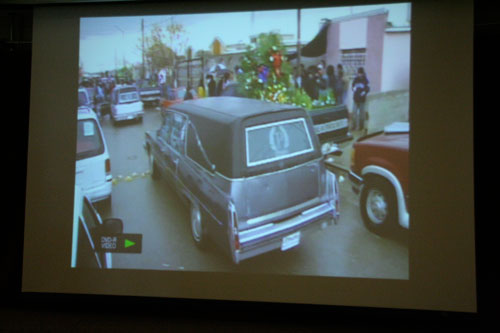By Matthew Boyle | mboyle@flagler.edu
Photos by Matthew Boyle
PHOTO CAPTION: Alfredo Corchado speaks at Flagler’s Communication Week. Angela Kocherga, Border Bureau Chief of television network Belo, stands with him.
Dallas Morning News Foreign Correspondent Alfredo Corchado thinks Americans need to invest more interest in helping Mexico battle drug cartels.
Only a few days before Corchado’s scheduled Monday speech at Flagler College’s Communication Week, a group of high-profile federal officials led by U.S. Secretary of State Hillary Clinton, Secretary of Defense Robert Gates and Secretary of Homeland Security Janet Napolitano announced a trip to Mexico City to pledge more U.S. support in the fight against drug cartels.
“He could have canceled and we would have understood that there was no way he could make the commitment,” Rosemary Tutt, assistant professor of communication, said. “The fact that he would [still come] is astounding.”
Corchado and television network Belo’s Border Bureau Chief Angela Kocherga, who spoke with him on campus, believe the drug cartel issues are so important that they need to make all Americans, especially students, aware of them.
“Young people are often the ones who are killed and who are doing the killing,” Kocherga said.
After Kocherga and Corchado spoke to Flagler students on Monday, they flew directly to Mexico City to cover the U.S. government press conference on Tuesday morning. What came of it in the national press, though, may be slightly disconcerting.
On Wednesday, the Wall Street Journal published a small story, tucked away on page A13 with no pictures, USA Today included a story without a byline attributed to “wire reports,” and the New York Times ran a story with a picture at the bottom of page A4.
Many major daily newspapers nationwide, including the Boston Globe, Washington Post, Chicago Tribune, Miami Herald, Seattle Times, Philadelphia Inquirer, Tampa Tribune and Houston Chronicle, didn’t even mention the issue on their front pages on Wednesday.
“That’s really depressing,” Corchado said. “It’s probably the closest thing to a Mexican revolution because of violence, because of what’s at stake. It’s a country really trying to redefine itself.”
He said Americans often think the violence and crime is contained in Mexico but he said criminal organizations are operating on both sides. Corchado said a lot of hit men come from the U.S. side.
Between journalists and support staff, Corchado said the Dallas Morning News used to have between 11 and 13 employees in Mexico City with a big office to work in.
“We had drivers, we had researchers, we had office managers and we had a bureau in Panama responsible for covering South America and parts of Central America,” Corchado said. “We had someone in Havana. We had people in London and we had people in the Far East.”
Now, Corchado is the only foreign correspondent worldwide for the Dallas Morning News. He doesn’t have an office in Mexico City. He works from his apartment.
Drugs that cartels run through Mexico into the United States, Corchado said, include, cocaine, methamphetamines, marijuana and heroin but that cartels make illegal profits off many more contraband items than drugs. Other organized crime revenue sources include illegal gun and weapon trading, illegal cash flows and human trafficking, including illegal immigration into the United States.
Corchado said that, if something’s illegal, cartels will find a way to make money off of it. Something else drug cartels are notorious for, Corchado said, is finding new ways to terrorize the masses.
“I think we are so trained to see relations between East and West and we rarely see things North and South,” Corchado said. “We never really had to and I think that mindset still permeates the American pscyhe. If Mexico tomorrow switched to Islam, it would change.”
 |
| PHOTO CAPTION: Drug cartel violence victims are taken away in hearses in Mexico. Kocherga and Corchado showed videos of what they’ve seen in Mexico to Flagler students. |
He and Kocherga said drug cartel leaders, much like al-Qaida terrorists, use social media to instill fear into and maintain control over Mexicans. Kocherga said cartels regularly use Twitter and Youtube as tools to scare people and track down potential enemies, including journalists.
Since 2000, they said 61 journalists have been confirmed killed by drug cartels and dozens more are still missing.
Corchado said Mexican journalists and citizens ask the U.S. people one favor: “Don’t forget about us.”
Kocherga and Corchado said there’s often an “unofficial pact” between organized crime and Mexican government officials. Corchado said he’s hesitant to trust anyone and his natural reporter’s skepticism is much more difficult for sources to break through.
“Organized crime is a huge influence on illegal immigration,” Corchado said. “Anything that’s illegal in the United States, organized crime will pounce on it. Smugglers now charge [illegal immigrants] a fee to use one of their routes into the United States.”
In total, more than 18,000 people have been killed by drug cartel violence since 2006 and Corchado thinks it hasn’t hit rock bottom yet. Soon, he hopes, the situation will reach a critical point and order will be restored.
As for next year’s Communication Week at Flagler, Tutt said Corchado and Kocherga are invited and she hopes they’ll get to stay a little bit longer. Tutt said this is the second year in a row they’ve had to leave in a hurry, and thinks the third year is the charm.



Be the first to comment on "Drugs, violence wear down order in Mexico"